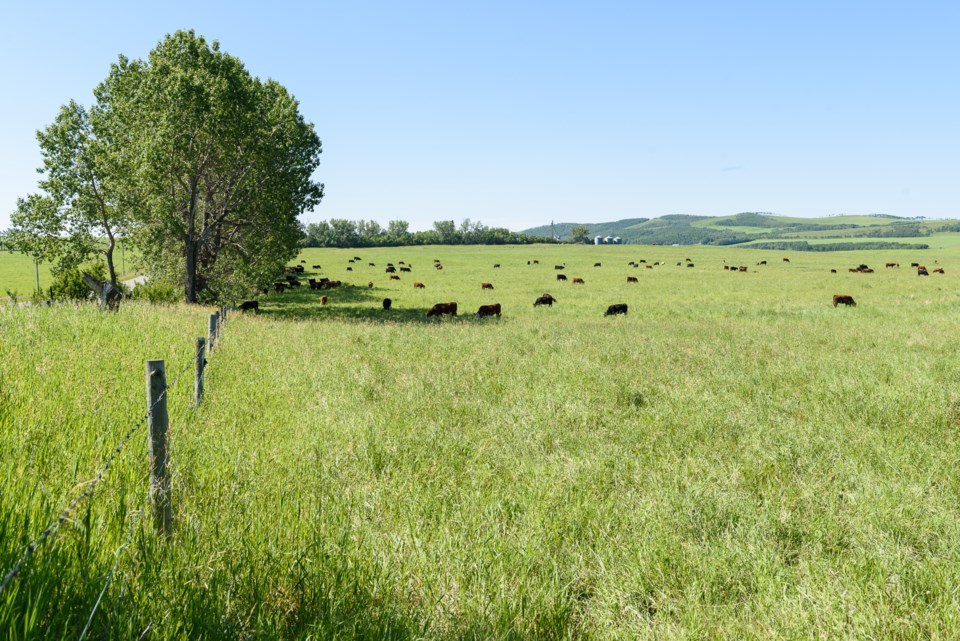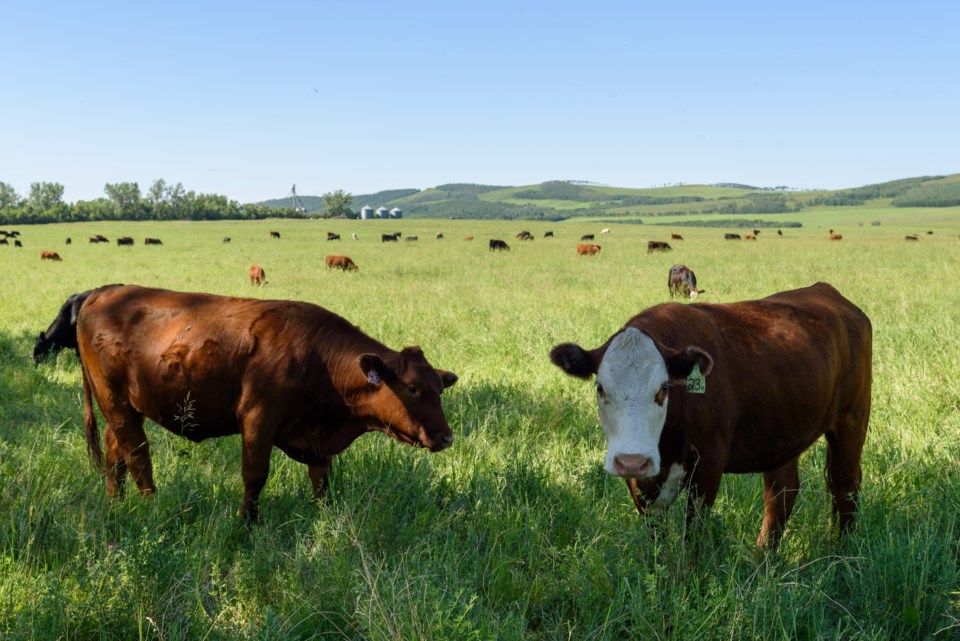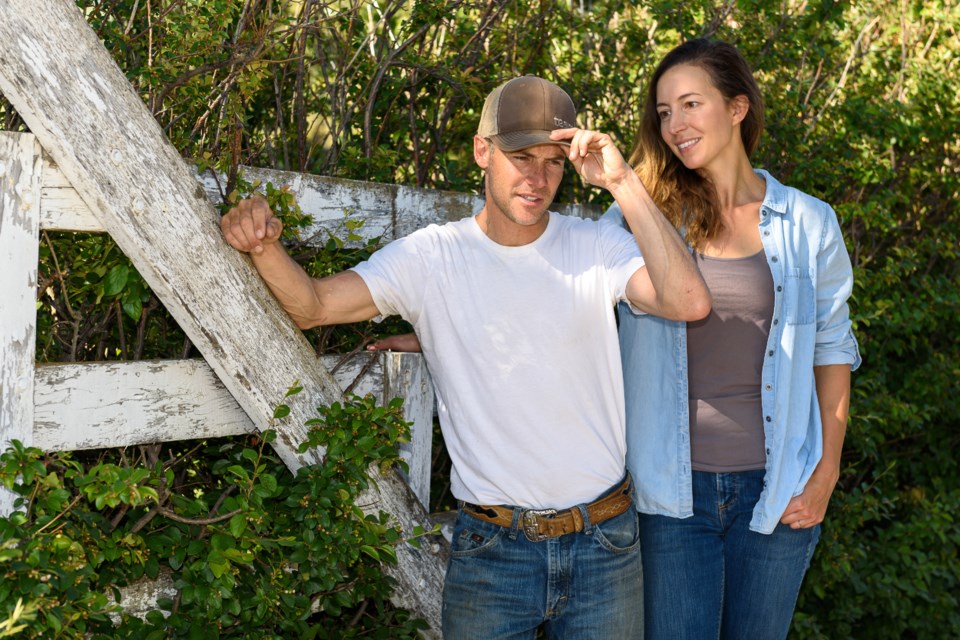The grass is green and growing on the Tullichewan Ranch after July rains, and cattle graze contently on rolling fields nestled in a valley north of Black Diamond.
On 1,500 acres of grassland, the ranch is a long way from the office towers of downtown Calgary. Owner-operator Ben Campbell had worked as an engineer but is now proud to be successfully running a family-owned ranch in Foothills County.
Together with his wife Steph, they run a herd of a few hundred animals, direct marketing grass-fed beef and raising commodity beef. Their efforts led to Ben being named the 2022 Outstanding Young Farmer for the Alberta/NWT region by the Canada’s Outstanding Young Farmers Program.
Their operation is the only traditional family farm for miles around, Ben said.
“It’s a dying way of doing things,” he said. “And it’s fun to push back against that.”
Although he technically grew up on a cattle ranch, Ben didn’t have a background in the industry, and said his upbringing was more like living on an acreage.
“I was not an agricultural guy in any way,” he said. “I didn’t know anything about cattle.”
Ben’s dad, who worked off the ranch, had no part in the operation that was run by Ben’s grandfather.
"We didn’t personally have any livestock, or do any daily chores,” he said.

It wasn’t until 2013 that Ben began raising his own cattle, starting out on rented land with four yearlings and growing the business from there. Ben and Steph took a long and winding road to get to where they are today.
After finishing high school, Ben knew he liked school and cared about people and the environment, but he had no idea what he wanted for a career.
“I wanted to do something that made the world a better place,” he said. “I wanted my life to matter in a positive way.”
And he was adamant he didn’t want to simply punch a clock and live for the weekend.
“I wanted to try my best to have a positive impact,” he said.
In university, Ben enrolled in kinesiology, but switched to biology and finally to engineering, graduating with an engineering degree.
“I switched into engineering just because I liked math and science, and I thought that it’s a good degree to have,” he said.
“But I didn’t even really think I wanted to be an engineer, necessarily.”
Ben was hired by Engineers Without Borders, and moved to Zambia to do engineering work for a cotton company there.
Ben and Steph married in 2006, and she took the trip with him. With her nursing degree, she began volunteering at a local hospital and training other nurses.
“I didn’t have a job, but I knew I wanted to go,” she said of the chance to live in Africa. “Let’s take what life gives you and make the best of it.”
They spent a year there, and when they came back, Ben didn’t know what to do next.
Steph was pursuing her nursing career, while Ben took up falconry as a full-time hobby before once again joining the workforce.
“Eventually, I gave up. I gave in and became a real engineer,” said Ben, who began working for a large company on oil and gas projects north of Fort McMurray.
It was a “pretty typical Alberta engineer thing,” working on mega-projects around the oildsands region, but Ben began to sense that something was missing.
“I could see people that were doing it, it was their passion,” he said, adding that it was a real contrast to how he felt about the work.
“So, I knew it wasn’t the right fit for me.”
Steph was working in a Calgary emergency room and said that time was about figuring life out and trying to find things that fit their passions.
"(We were) looking for a way to raise a family and make a difference in the world while doing that,” she said.

Ben was still searching for something that would check those boxes, and that’s when cattle ranching came to his attention.
A friend told him about grass-fed beef, and how grazing cattle can be good for the environment, and about how healthy cattle make healthy food and a healthy ecosystem.
Ready to try just about anything at that point, the idea of using cattle as a sustainable and ecologically friendly way to support a family struck a chord.
“So, I just immediately bought four yearlings,” said Ben. “And that was the first four beef we ever produced.”
That was in 2013, and those four yearlings set the Campbells on the path of eventually having a herd of up to 500 animals.
As luck would have it, that year Ben’s father took over management of the home ranch, for the first time in his life, and that was the beginning of Ben’s education in cattle ranching.
He was hooked right away, even though he had a lot to learn about every aspect of the business and was still working full-time as an engineer. He took care of his own small herd, and helped his dad, evenings after work.
With a lot to learn, mentorship played a huge role in the couple's success, and Ben is thankful for the welcome he got from the agricultural community as a newcomer in the industry.
“I didn’t even know anyone in agriculture when I started,” he said, so he worked hard to build relationships and learn from others so that when he had questions, he had someone to call.
Steph, too, took some courses and enrolled in grazing school a few times.
“I’ve tried to learn as much as I can about grazing and ranching and cattle, I try to cram as much as I can in,” she said, balancing ranch work with family obligations and her part-time position as a registered nurse.
The two are co-decision makers and manage the ranch as partners. To survive, they try to operate as efficiently as possible and plan well in advance.
Growing the herd year-over-year, the Campbells got into commodity beef, which they graze side-by-side with the grass-fed direct to market animals. They don’t calve or cut hay, and they try to run the ranch as simply as they can.
“From the business side, we’ve cut down overhead costs a lot and made this way more efficient,” Ben said.
Ben’s philosophy is to manage the herd as closely as he can to how bison would manage themselves on the land, and he sees grass and cattle as being in a symbiotic relationship.
“We’re a nature-based business,” Ben said.
Grazing cycles all those nutrients back to the land, and the result is a much more vigorous and healthier stand of grass, Ben said, adding that he almost never turns his tractor on.
But it wasn’t easy getting started, and Ben hung on to his full-time engineering job until 2018.
Ranching can be a tough business.
Steph comes from a farming background, and her family advised against going down that road. She heard things like it isn’t a good way to raise a family, and you’re going to lose money, even though you’ll be working all the time.
Part of the challenge of switching careers and making the leap, Steph said, is that you have to make smart decisions and streamline things to make it work.
It has turned out pretty well, and Steph said she can’t imagine a better lifestyle than raising a family on the ranch.
In 2019, the opportunity came to buy land on the farm. They hadn’t planned on it, but bought 320 acres, which included Ben’s grandparents' house and the farmyard. Rental contracts were secured for the rest of the land that makes up the ranch.
The couple set to work fixing up the place, spending countless hours making improvements to the buildings and infrastructure.
“When I was taking things apart, I was undoing screws and bolts and pulling nails that my grandfather had put in when he was my exact age,” Ben said.
“I found his footprints in the barn, in the concrete."
Ben hopes that in 60 years, his grandchildren will be pulling out the nails he put in.
The goal is to build the ranch into a functional business for his kids. The Campbells have three sons, five, seven and nine.
“I want it to be able to support all my kids, if they want,” he said.
There are a lot of different opportunities to generate income in Foothills County that don't exist in other places, he said.
“As long as you're willing to capture all those opportunities, then it's OK,” he added.
For more information on the Tullichewan Ranch and its grass-fed beef, visit grazedright.com.




